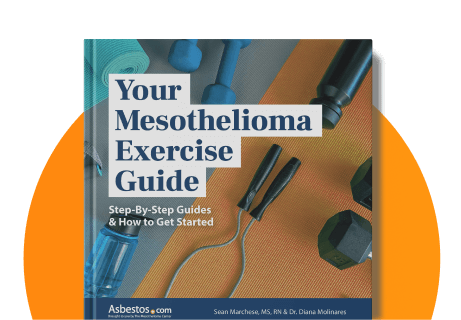Access Free VA Claims Assistance

Free Cancer Guide for Veterans

Find a Top Mesothelioma Doctor

The VA’s Geriatric and Extended Care programs offer many services that benefit veterans with mesothelioma, their caregivers and loved ones. Some of these benefits include respite care, home health care, palliative care and assisted living or nursing home care.
The U.S. Department of Veterans Affairs, also known as the VA, provides a number of different services for veterans with mesothelioma, their loved ones and caregivers. Some of these services include disability compensation, VA pensions, VA Aid and Attendance and VA Geriatric and Extended Care services.
The VA’s Geriatric and Extended Care programs provide a variety of services, including home health care, respite care, assisted living and community nursing homes. The VA lumps these services into two categories: Home and Community-Based Extended Care, and Residential Settings and Nursing Homes.
Veterans must meet certain eligibility criteria to access different services within the VA’s Geriatric and Extended Care programs. This criteria varies widely depending on which service a veteran wants to access.

For example, veterans must be enrolled in VA health care to access residential care, but not all veterans must be enrolled to access community care. To access residential care, the VA must conclude that the veteran needs a specific service to help with their ongoing treatment and personal care.
To be eligible for community care, a veteran must meet one of six criteria. This could include living more than 40 miles away from a VA medical center, being unable to access care because a service is not offered, or the appointment wait time exceeds access standards.
If you need help understanding eligibility or applying for VA benefits, you may contact a VA social worker or speak with a VA-accredited claims agent for personalized assistance.
Access Free VA Claims Assistance

Free Cancer Guide for Veterans

Find a Top Mesothelioma Doctor

VA Home and Community Based Extended Care services may help veterans with mesothelioma and their loved ones cope with the disease from the comfort of their home or from medical providers in their community.
A homemaker or home health aide is trained to help veterans with daily living activities inside their home. Homemakers and home health aides are not nurses and cannot provide medical care, but they are supervised by a registered nurse who helps assess the veteran’s daily living needs.
Veterans with mesothelioma who need help with daily living activities benefit from this program, which can be combined with other Home and Community Based Extended Care services. It can also serve as a form of respite care for caregivers experiencing burden.
Veterans with debilitating mesothelioma symptoms benefit greatly from the Home Based Primary Care program because it allows them to receive professional health care directly at home.
The final stages of mesothelioma may cause veterans to become homebound because their overall health deteriorates significantly, which makes seeking care in a clinical setting challenging. This program is also available to veterans who are isolated and veterans whose caregiver is experiencing burden.
This service goes beyond the services provided through the Home Based Primary Care program. It provides services that include skilled nursing, physical therapy, occupational therapy, wound care, intravenous medication and case management.
This service helps veterans needing care at home after moving from a hospital or nursing home, and it also is available to veterans with end-stage mesothelioma who require ongoing skilled health care services.
Palliative care is a form of health care that focuses on controlling symptoms and improving quality of life. When combined with mesothelioma treatment, palliative care can help manage cancer symptoms and side effects of cancer treatment to improve a patient’s quality of life.
Veterans enrolled in VA health care are eligible for this service if they meet certain clinical criteria. Palliative care is also available through VA Residential Settings and Nursing Homes services.
Other Home and Community Based Extended Care Services
Other services within the VA’s Home and Community Based Extended Care programs may benefit veterans with mesothelioma, including:

Learn about mesothelioma, asbestos exposure in the military and top treatments in our updated 2025 guide.
Get Your Free GuideThe VA’s Geriatrics and Extended Care services are offered in residential settings or nursing homes and provide two different levels of care.
In general, the care offered in residential settings is appropriate for veterans who need help with daily living activities but don’t require skilled medical care. This could be ideal for veterans with early-stage mesothelioma.
Nursing homes provide more skilled medical care, which may be appropriate for veterans with end-stage mesothelioma.
Assisted living facilities provide living space and a sense of community for veterans who may need help with daily living activities but don’t require skilled medical care.
Veterans live in a rented room or apartment and share some living spaces, such as a dining room, and have access to a trained caregiver. Assisted living facilities may be ideal for veterans with mesothelioma who don’t have a loved one who can care for them at home.
Adult family homes are similar to assisted living facilities except they are much smaller private homes where six or fewer veterans rent rooms and share living spaces. These homes feature a trained caregiver to help with daily living activities. Veterans who require extra care may hire a nurse to provide that care as needed.
A community living center is a VA nursing home. More than 100 of them are located throughout the U.S. They provide a sense of community much like an assisted living facility but with the addition of skilled nursing and medical care. This level of care is helpful for veterans with end-stage mesothelioma who require skilled nursing and a higher level of medical care.
Community nursing homes offer the same type of care available at a VA community living center. The difference is that the VA contracts with individual nursing homes to allow veterans to receive care near their homes and families. This option is ideal for veterans who don’t live near a VA community living center and require skilled nursing.
VA health care offers a multidisciplinary approach to managing veteran health known as Patient-Aligned Care Teams, or PACT. In 2010, the VA introduced the Geriatric Patient-Aligned Care Team, or GeriPACT model, to address the unique needs of older adults. The VA also offers Gerofit, an exercise program that promotes health and wellness for older veterans.
A VA geriatric evaluation is a comprehensive health evaluation performed by a team of multidisciplinary experts designed to optimize health, improve quality of life, promote independent living and reduce the need for hospital visits and long-term care services.
All veterans enrolled in GeriPACT receive a geriatric evaluation as often as needed. The evaluation addresses physical, mental, psychological and social health to develop a comprehensive care plan for the veteran. It helps veterans and their caregivers learn to manage age-related changes in health.
The Gerofit exercise program for older veterans was founded in 1986 through the Durham VA Health Care System. It was so successful that the VA now offers it at 17 VA medical centers throughout the country. It provides online videos and resources so that any veteran can follow the program at home.
Gerofit helps older veterans stay active through a variety of strength training and cardiovascular exercises. Veterans may participate in group classes, such as dancing, yoga and tai chi, from the comfort of their home or at one of the 17 locations that offer the program.
Veterans receive a personalized exercise prescription and guidance on how to exercise safely and modify routines to accommodate their needs.

Access safe, effective exercises to enhance your well-being and improve your quality of life.
Get Your Free GuideThe VA Program of Comprehensive Assistance for Family Caregivers provides benefits to veterans with mesothelioma and their family caregivers. VA caregiver benefits include a monthly stipend, 30 days a year of respite care, mental health counseling, caregiver education and training, access to health care benefits and financial assistance for traveling with a veteran to access care.
A veteran can appoint one primary family caregiver and two secondary family caregivers to their caretaker team through this program. Eligible veterans must already be enrolled in VA health care to apply for caregiver benefits.
The VA pays for many of the services offered through its Geriatric and Extended Care programs. They consider a number of factors in determining what a veteran owes for various services, including their disability status and income. Veterans can expect copays for certain services and may need to pay out of pocket for select services.
For example, rent at an assisted living facility is not covered by the VA, but veterans may use compensation received through the VA and other government programs, such as disability compensation, Medicare and Medicaid, to pay for it.
Additional sources of compensation to pay for copays and other costs include a VA pension, VA Aid and Attendance and mesothelioma compensation accessed through an asbestos trust fund list and mesothelioma legal claims. Veterans may also apply for the VA Fiduciary Program to get their finances in order and maximize benefits offered through the VA.
The VA offers a variety of services that benefit veterans with mesothelioma through its Geriatric and Extended Care programs. Caregivers and loved ones may also access supportive services through the VA, including monthly compensation, mental health care and respite care.
Veterans with mesothelioma and their loved ones may reach out to a VA-accredited claims agent to discuss these services and access assistance in applying for these benefits.
Recommended ReadingStay up-to-date on treatment, research, clinical trials, doctors and survivors
The information on this website is proprietary and protected. It is not a substitute for professional medical advice, diagnosis or treatment. Any unauthorized or illegal use, copying or dissemination will be prosecuted. Please read our privacy policy and terms of service for more information about our website.
This website and its content may be deemed attorney advertising. Prior results do not predict a similar outcome.
The Mesothelioma Center’s claim as the most trusted resource is based on our more than 150 5-star Google and BBB reviews. Our organization also helps more than half of all mesothelioma patients annually diagnosed.
Your web browser is no longer supported by Microsoft. Update your browser for more security, speed and compatibility.
If you are looking for mesothelioma support, please contact our Patient Advocates at (855) 404-4592
The Mesothelioma Center at Asbestos.com has provided patients and their loved ones the most updated and reliable information on mesothelioma and asbestos exposure since 2006.
Our team of Patient Advocates includes a medical doctor, a registered nurse, health services administrators, veterans, VA-accredited Claims Agents, an oncology patient navigator and hospice care expert. Their combined expertise means we help any mesothelioma patient or loved one through every step of their cancer journey.
More than 30 contributors, including mesothelioma doctors, survivors, health care professionals and other experts, have peer-reviewed our website and written unique research-driven articles to ensure you get the highest-quality medical and health information.
My family has only the highest compliment for the assistance and support that we received from The Mesothelioma Center. This is a staff of compassionate and knowledgeable individuals who respect what your family is experiencing and who go the extra mile to make an unfortunate diagnosis less stressful. Information and assistance were provided by The Mesothelioma Center at no cost to our family.LashawnMesothelioma patient’s daughter


Whitmer, M. (2025, November 13). VA Geriatrics and Extended Care Services. Asbestos.com. Retrieved December 29, 2025, from https://www.asbestos.com/veterans/va-claims/geriatrics-extended-care/
Whitmer, Michelle. "VA Geriatrics and Extended Care Services." Asbestos.com, 13 Nov 2025, https://www.asbestos.com/veterans/va-claims/geriatrics-extended-care/.
Whitmer, Michelle. "VA Geriatrics and Extended Care Services." Asbestos.com. Last modified November 13, 2025. https://www.asbestos.com/veterans/va-claims/geriatrics-extended-care/.

Danielle DiPietro is a Financial Advocate and VA-accredited claims agent at The Mesothelioma Center, the nation’s most trusted mesothelioma resource. She helps all mesothelioma patients and their families, including veterans, find the best answers to their financial and VA questions.
Our fact-checking process begins with a thorough review of all sources to ensure they are high quality. Then we cross-check the facts with original medical or scientific reports published by those sources, or we validate the facts with reputable news organizations, medical and scientific experts and other health experts. Each page includes all sources for full transparency.
Please read our editorial guidelines to learn more about our content creation and review process.
